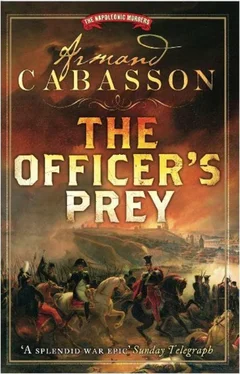Margont wondered who the person was to whom he owed the pleasure of this summons.
‘If you are successful, you will be promoted to major. You will immediately receive ten years’ pay.’
Margont had visions of himself in a small mansion in Nîmes or Montpellier …
The prince continued, ‘The necessary official explanations will be given but the mission must never be mentioned. Do you accept?’
‘The fact is, Your Highness has not—’
‘Thank you for this resounding and unqualified “yes”. I knew the Empire could count on you. Here is a quick summary of this whole wretched business. Last night in Tresno, a small Polish town near the River Niemen, a woman was murdered in her bedroom. She was called Maria Dorlovna – Polish but of German extraction. Her murder was a terrible butchery. If that were the whole story I wouldn’t even have been informed of it and the military police would now be investigating. The problem is, it is possible that the culprit may be an officer serving in the army corps that I have the honour of commanding.’
Margont responded to the news with an aplomb that both pleased and amazed the prince.
‘Such calmness, Captain. You barely seem surprised. It couldn’t be you, by any chance, could it? That would simplify my life considerably.’
‘Unfortunately, I regret to say that I must disappoint Your Highness.’
‘What impertinence! Well, the person who recommended you did warn me of that displeasing trait of yours. I must confess that it made me hesitate before choosing you.’
Not enough, unfortunately, thought Margont.
‘But I said to myself that a good many of our finest officers were the personification of impertinence. Look at Murat. He charges at the head of his squadrons and sometimes considers himself a one-man vanguard. Then there’s Ney, the great Ney. On the battlefield he’s everywhere at once, always rushing to where the action is fiercest, like a moth drawn to the light. Lasalle, too. He dubbed any hussar who hadn’t died by the age of thirty a wastrel. What’s more, he followed his own precept at Wagram, only a few years late. And don’t all these heroes, and the Empire itself, spring from the greatest and most daring example of impertinence of all: the people of France decreeing a republic? In France, insolence is not a defect, but a badge of honour! That said, it’s like alcohol: it quickly goes to your head and causes blunders, so do not overindulge.’
The prince folded his arms and stared Margont straight in the eye.
‘I suppose your quip was a clever manoeuvre designed to make me choose someone else. It was crafty but it hasn’t worked. Far from discouraging me, you have confirmed me in my decision. So, as I was saying, it would appear that the murderer is one of my officers.’
The prince gave Margont an account of the race across the rooftops and the confrontation between the sentry and the fugitive.
‘The sentry stood to attention? Are you sure of that?’ said Margont with a surprised look.
Eugène stiffened and his brow furrowed. It was clear that he would dearly have liked to say the opposite of what he must.
‘I’m quite certain, thanks to the testimony of another sentry, who was too far away to intervene but who saw the whole scene. The soldier who was stabbed had the rank of sergeant. A sergeant would not suddenly have stood to attention in front of an immediate superior who had just jumped down from a roof, was not wearing regulation uniform and was not on duty. No, given the way he reacted and the speed with which he did so, he must undoubtedly have recognised an officer. At least a captain, or perhaps someone of even higher rank … Now then, Captain Margont, take that look off your face. Anyone would swear that you were no longer listening to me and that you were desperately searching for a way of shirking this task.’
Margont was absent-mindedly tapping the hilt of his sword.
‘For it to be a captain is just about acceptable, Your Highness. But if it is someone of higher rank …’
‘No arrests. Whether it’s a captain or a major – I dare not imagine anyone above that – you will take no initiative. Nothing foolish or it’s the firing squad!’
‘I take Your Highness at his word.’
‘You will draw up a report for me in the greatest secrecy and I will take the necessary steps.’
The prince breathed in slowly, which Margont took to be a ploy intended to give emphasis to what he was about to say.
‘Captain, have you given a moment’s thought to what would happen if the rumour spread that one of our French officers is a maniac who tortures and butchers Polish women? All the regiments would denounce their own captains, majors, colonels … Whole companies would refuse to obey the orders of the man they took to be the murderer. But, even worse, the victim was Polish and of German extraction. You can well imagine the reaction of the tens of thousands of Poles, of Germans from the Confederation of the Rhine, and of Prussians and Austrians taking part in this campaign. Already there’s little love lost between the Prussians, the Austrians and ourselves. It would not take much to inflame people’s passions. There would be disagreements, desertions … If this matter were taken up by agitators, spies and enemies of France, it could shake to the foundations the carefully constructed diplomatic edifice built up by the Emperor.’
The prince stood up and began to walk around the two chairs.
‘You were at the battle of Auerstädt.’
‘That is correct, Your—’
The Viceroy interrupted him abruptly with a wave of the hand. ‘Of course it is correct. I know all about you. At Jena and Auerstädt we blew these wretched Prussians and their Saxon allies to smithereens. And today they are at our side, fighting with us against the Russians!’
The prince spread his arms in a gesture of powerlessness. ‘Ah, the miracles of diplomacy! I shall never get used to it, even though I observe its rituals. In short, a rumour such as “A French officer is murdering and mutilating Polish women” – and “officer” would soon become all officers, and the Polish woman would become in turn German for the Germans, Prussian for the Prussians, Austrian, Saxon, et cetera – is quite enough to rekindle ill feeling in the hearts of those who lost a brother, a cousin, a friend or an arm at Jena, in Italy, at Wagram …’
The prince continued to walk around in a circle as if this circle embodied the problem he was unable to solve.
‘When the Emperor was told about this business, he lost his temper. He began to rant at my messenger in Corsican!’
The Viceroy stopped dead. He was lost in thought and was staring at the elaborate arabesques on the rug.
‘Just think about the Russian civilian population!’ he exclaimed all of a sudden, raising his head. ‘How could we rally them to our cause, or at least prevent them from doing too much harm to our rear? “Here come the women-killers!” Pillagers! Yes, they’ll think we are pillagers. And what about the Emperor? He’ll fly into a rage again, that’s for sure. Then there are the Germans …’
His words were becoming more and more disjointed as troubled thoughts swirled around in his head. Margont had the impression that the prince was hiding something from him. It was a vague feeling prompted by various small details: an evasive look; a hurried delivery as if Eugène wanted to convince him quickly; a puzzled expression; lips that opened as if about to say something then closed again immediately … It lasted a few moments, then the prince’s attitude became perfectly assured again.
‘Captain, you are going to unmask this man for me!’
Eugène spoke these words with incisive firmness. If he had been hesitating about whether to reveal an extra piece of information, he had in the end decided to keep it to himself.
Читать дальше












